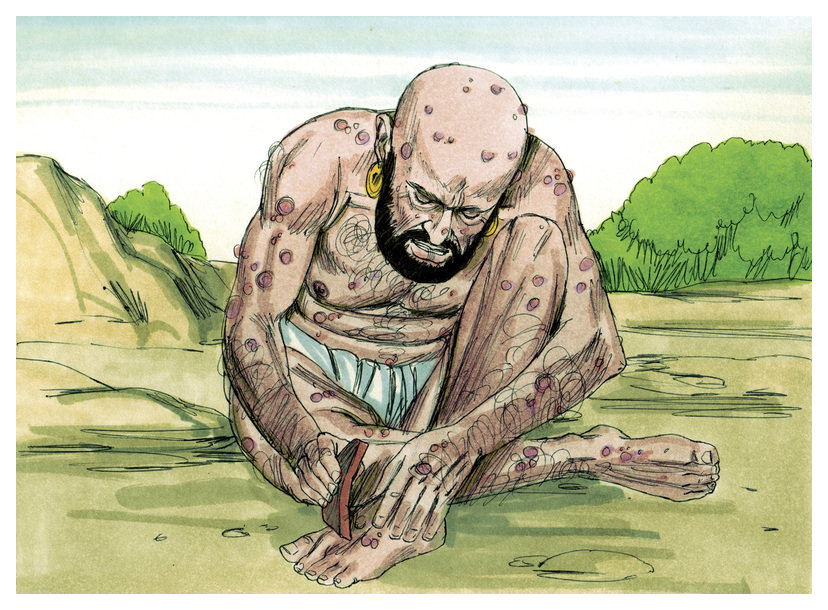
The book of Job
We've spent some time talking about the psychology of loss on TAE – see, A Glimpse Into the Stubborn Psychology of Fish, A Glimpse Into the Self-Destructive Psychology of Sharks, The Short Story of How We Lose. The fact is, though, that these discussions remain abstract and hypothetical for most people who are relatively well-off in the developed world, and it will always be that way until we actually see the people around us losing most of what they have, or until we ourselves lose the things we value the most in life. It is difficult to imagine exactly how painful such a process would be, and how we would react.
One of the oldest and most well-known stories of such loss is that of Job, found in the Old Testament. To briefly summarize – Job was a very pious, righteous and caring man, blessed with a lot of wealth, a comfortable yet meaningful life, and a large, loving family. As a test of his Faith, though, he lost almost everything in the course of a few hours on one dreadful afternoon. His land was destroyed, and his cattle, servants and children were all killed in a series of disasters. Yet the test still wasn't complete…

While he was deeply mourning his losses, Job came down with a severe and painful affliction, which produced horrible sores on his body from "the soles of his feet to the top of his head" and tormented him every moment of every hour of every day for seven days. After three of his friends sat with him in silence for seven days and seven nights, Job finally expressed his sorrow and agony in this poetic outburst of emotion, in which he cursed the day he was born.
3 "May the day of my birth perish,
and the night it was said, 'A boy is born!'
4 That day—may it turn to darkness;
may God above not care about it;
may no light shine upon it.
5 May darkness and deep shadows claim it once more;
may a cloud settle over it;
may blackness overwhelm its light.
6 That night—may thick darkness seize it;
may it not be included among the days of the year
nor be entered in any of the months.
7 May that night be barren;
may no shout of joy be heard in it.
8 May those who curse days curse that day,
those who are ready to rouse Leviathan.
9 May its morning stars become dark;
may it wait for daylight in vain
and not see the first rays of dawn,
10 for it did not shut the doors of the womb on me
to hide trouble from my eyes.
11 "Why did I not perish at birth,
and die as I came from the womb?
12 Why were there knees to receive me
and breasts that I might be nursed?
13 For now I would be lying down in peace;
I would be asleep and at rest
14 with kings and counselors of the earth,
who built for themselves places now lying in ruins,
15 with rulers who had gold,
who filled their houses with silver.
16 Or why was I not hidden in the ground like a stillborn child,
like an infant who never saw the light of day?
17 There the wicked cease from turmoil,
and there the weary are at rest.
18 Captives also enjoy their ease;
they no longer hear the slave driver's shout.
19 The small and the great are there,
and the slave is freed from his master.
20 "Why is light given to those in misery,
and life to the bitter of soul,
21 to those who long for death that does not come,
who search for it more than for hidden treasure,
22 who are filled with gladness
and rejoice when they reach the grave?
23 Why is life given to a man
whose way is hidden,
whom God has hedged in?
24 For sighing comes to me instead of food;
my groans pour out like water.
25 What I feared has come upon me;
what I dreaded has happened to me.
26 I have no peace, no quietness;
I have no rest, but only turmoil."

Even after all of this, Job's friends endlessly try to console him with "tough love", accusing him of being sinful, and they eventually turn on him for being so sorrowful and "ingorant" of God. Job is actually chastised by these so-called friends, instead of consoled, which only adds to his suffering. Of course, Job ultimately passes the test of his Faith, cursing anything and everything around him, including the day he was born and his own existence, but never once denying or cursing God. That is the story of Job's incalculable losses in a nutshell.
If you are like me, then you can't help but stop and wonder how you would react in Job's situation, or how the people around you would react. It is an especially important consideration in times like these, when those who have accumulated great wealth and status and comforts can easily be reduced to nothing in short order; when everything they take for granted, including their loved ones, can be taken away from them. Who among us would have the resolve of Job, never once lifting our hands in violence against others or ourselves, or losing Faith in a higher power?
The sad truth is that the world will be filled with Jobs over the next few decades – people who never knew the pain of severe, systematic loss before, but are quickly plunged into exactly those circumstances. There are certainly many people who are already starting to find themselves in such dreadful scenarios, but the numbers will only grow larger and "closer to home" over time. The threat of financial loss will be unprecedented, as will the threat of physical loss from natural disasters, human violence and disease (all things Job experienced).
Evidence of these converging crises is all around us, from the escalating financial/banking stress across the world to the sociopolitical unrest in the Eurozone, Middle East and Far East, to the rapid rates of air/water pollution, soil erosion, radiation poisoning, etc., to the droughts, famines and severe weather events, to the geopolitical uncertainty in the ME, and much, much more. These things are happening right now, and while there may be some positive developments occurring in the opposite direction, they are few and far between.
The global financial crisis by itself has the potential to produce devastating consequences across all spheres of modern life in our highly inter-connected, inter-dependent world. Our global systems have been deisgned to take crises that may initially effect only one specific area and magnify its impact and generalize the resulting losses throughout the entire world. That fact was illustrated nicely by the latest report from David Korowicz entitled, Trade-Off: Financial system supply-chain cross contagion (a study in global systemic collapse).

Overview
This study considers the relationship between a global systemic banking, monetary and solvency crisis and its implications for the real-time flow of goods and services in the globalised economy. It outlines how contagion in the financial system could set off semi-autonomous contagion in supply-chains globally, even where buyers and sellers are linked by solvency, sound money and bank intermediation. The cross-contagion between the financial system and trade/production networks is mutually reinforcing.
It is argued that in order to understand systemic risk in the globalised economy, account must be taken of how growing complexity (interconnectedness, interdependence and the speed of processes), the de-localisation of production and concentration within key pillars of the globalised economy have magnified global vulnerability and opened up the possibility of a rapid and large-scale collapse. 'Collapse' in this sense means the irreversible loss of socio-economic complexity which fundamentally transforms the nature of the economy. These crucial issues have not been recognised by policy-makers nor are they reflected in economic thinking or modelling.
As the globalised economy has become more complex and ever faster (for example, Just-in-Time logistics), the ability of the real economy to pick up and globally transmit supply-chain failure, and then contagion, has become greater and potentially more devastating in its impacts. In a more complex and interdependent economy, fewer failures are required to transmit cascading failure through socio-economic systems. In addition, we have normalised massive increases in the complex conditionality that underpins modern societies and our welfare. Thus we have problems seeing, never mind planning for such eventualities, while the risk of them occurring has increased significantly. The most powerful primary cause of such an event would be a large-scale financial shock initially centring on some of the most complex and trade central parts of the globalised economy.
The argument that a large-scale and globalised financial-banking-monetary crisis is likely arises from two sources. Firstly, from the outcome and management of credit over-expansion and global imbalances and the growing stresses in the Eurozone and global banking system. Secondly, from the manifest risk that we are at a peak in global oil production, and that affordable, real-time production will begin to decline in the next few years. In the latter case, the credit backing of fractional reserve banks, monetary systems and financial assets are fundamentally incompatible with energy constraints. It is argued that in the coming years there are multiple routes to a large-scale breakdown in the global financial system, comprising systemic banking collapses, monetary system failure, credit and financial asset vaporization. This breakdown, however and whenever it comes, is likely to be fast and disorderly and could overwhelm society's ability to respond.
We consider one scenario to give a practical dimension to understanding supply-chain contagion- a break-up of the Euro and an intertwined systemic banking crisis. Simple argument and modelling will point to the likelihood of a food security crisis within days in the directly affected countries and an initially exponential spread of production failures across the world beginning within a week. This will reinforce and spread financial system contagion. It is also argued that the longer the crisis goes on, the greater the likelihood of its irreversibility. This could be in as little as three weeks.
This study draws upon simple ideas drawn from ecology, systems dynamics, and the study of complex networks to frame the discussion of the globalised economy. Real-life events such as United Kingdom fuel blockades (2000) and the Japanese Tsunami (2011) are used to shed light on modern trade vulnerability.
So, the question again is – what will you do when the contagion hits your neck of the woods? How will you react to the devastating losses that are forced on you by natural developments and by human actors? There are certainly ways to prepare and insulate onself from these risks, many of which have been discussed on TAE, but no one can ever be certain that they will avoid the worst of it. We must search our psychological recesses and try to understand the things which will preserve our Faith in such a scenario, whatever those things or that Faith may be.
Perhaps there are people out there, including TAE readers, who have already experienced such losses and have wisdom to share, in which case we should seek out and welcome their counsel. None of us will get through these times alone, and many of us will suffer repeated experiences of sheer dread, pain and hoplessness. I can't imagine what someone like Job experienced when he went through his trials, but I can try to learn from the lessons of the past. There is such a thing as eternal wisdom, in my opinion, and we need to embrace it now more than ever.








Home › Forums › How Will We Handle Our Losses?